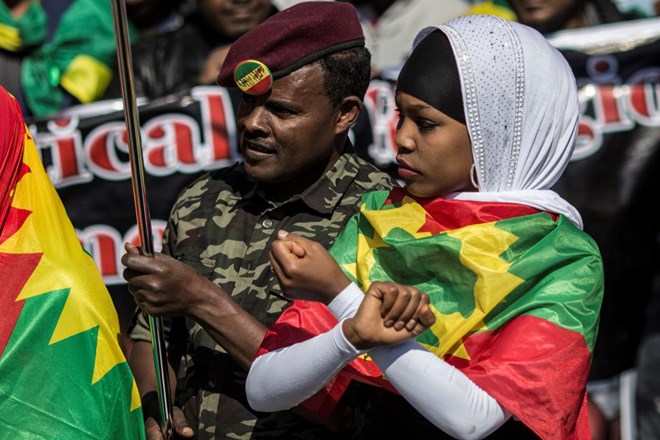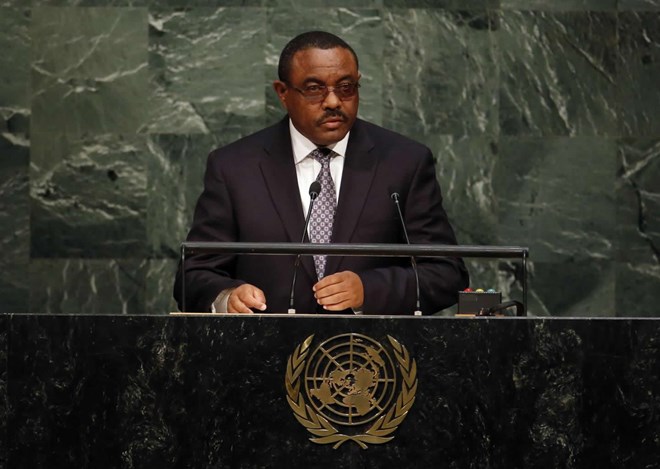
Wednesday September 20, 2017
By Conor Gaffey

A demonstrator (left) dressed in military
fatigues joins members of the Oromo, Ogaden and Amhara communities in
Johannesburg as they protest against the crackdown in the restive Oromo
and Amhara regions of Ethiopia, on August 18, 2016. Clashes on the
border between Ethiopia’s two biggest regions have killed at least 50
and displaced more than 50,000 in the past week. GULSHAN KHAN/AFP/Getty
Ethiopia is a major U.S. ally in Africa. The government in Addis Ababa has long cooperated with Washington on security and counterterrorism while benefiting generously from U.S. aid. In 2016, the U.S. pledged $809 million to Ethiopia, behind only war-torn South Sudan and Kenya, another Western ally, in sub-Saharan Africa.
But the U.S. Embassy in Addis Ababa struck an urgent and concerned tone on Tuesday when it issued a statement saying it was “disturbed by the troubling reports” on “ethnic violence and the large-scale displacement of people” along the border between the country’s two largest regions, Oromia and Somali.
“We urge the Ethiopian government to conduct a transparent investigation into all allegations of violence and to hold those responsible accountable,” said the embassy’s statement.
“At the same time, on the local level, communities must be encouraged and given space to seek peaceful resolutions to the underlying conflicts.”
Ethiopia has a federal government with oversight over regional authorities, and regions are largely demarcated along ethnic and linguistic lines. Oromos, the largest ethnic group in Ethiopia, tend to be farmers, while Somalis are often pastoralists, and the border has been a flashpoint for conflicts over grazing land and natural resources in the past, according to the BBC.
The latest outbreak of violence has killed at least 50 people and displaced more than 50,000, according to Reuters. But the cause is not yet clear, since both sides are blaming each other. Officials in Oromia have blamed raids by a paramilitary force from the Somali region, known as the Liyu police, as a major cause of the violence. But the Somali regional government has rejected that claim and accused the government in Oromia of sympathizing with the Oromo Liberation Front, a group seeking self-determination for Oromos, which is a banned terrorist organization in Ethiopia.
The clashes pose a delicate challenge for Ethiopia’s federal government and come only months after serious unrest in Oromia and other regions, which began with protests in November 2015 upon plans to expand the territory of Addis Ababa.
Security forces killed 669 people during the unrest, mostly in Oromia, according to an investigation mandated by the Ethiopian parliament. Ethiopian Prime Minister Hailemariam Desalegn imposed a repressive state of emergency in October 2016 that lasted for 10 months and was only lifted in August as the clashes subsided.

Ethiopian Prime Minister Hailemariam Desalegn addresses a summit at the United Nations headquarters in New York, on September 25, 2015. Andrew Kelly/Reuters
The prime minister announced at the weekend that federal police would be sent in to guard roads crossing the neighboring regions, while regional security forces were ordered to withdraw from the borderlands. Desalegn also met with religious leaders and elders in a bid to create a lasting solution to the border dispute, the Chinese news agency Xinhua reported. A 2004 referendum was supposed to resolve the issue, but both sides have accused each other of noncompliance with the result.
It seems that American eyes will be watching Desalegn and the Ethiopian government closely as they seek a solution to the violence.
“We believe Ethiopia’s future as a strong, prosperous and democratic nation depends on open and inclusive political dialogue for all Ethiopians, greater government transparency, and strengthening the institutions of democracy and justice,” said the U.S. embassy statement.
“These recent events underscore the need to make more rapid and concrete progress on reform in these areas.”